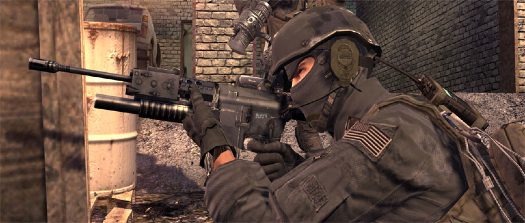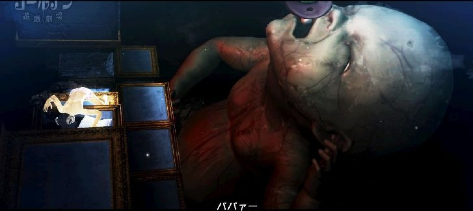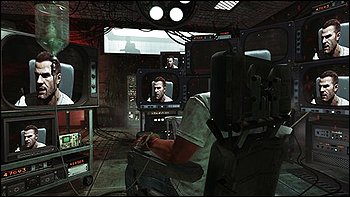Video Gaming Teaches Satanism
August 4, 2011
 If Anders Breivik's massacre of Norwegian teenagers seems like something out of a video game, that's no coincidence. The killer credits the game "Call of Duty" for his training.
If Anders Breivik's massacre of Norwegian teenagers seems like something out of a video game, that's no coincidence. The killer credits the game "Call of Duty" for his training. by Shannon Iyer
(henrymakow.com)
Shanon Iyer is a 27-year old Canadian screenwriter, author, inventor and gamer who lives in Mississauga, Ontario.
The entertainment industry is being used for satanic indoctrination. We see its symbols and writings everywhere; from models flashing one-eyed signs to directors and producers splicing in immoral imagery and ideals with normal everyday life. All this is done knowingly and willingly, intent on eliciting the viewers' "participation", usually carried outside the illusion into everyday life.
Yes, they want you to be comfortable to cheat on your wife, to callously mistreat your parents and go to war with your neighbor. They show you situations that seem almost impossible and then set out to impress you by overcoming the situation with relative ease. This is the successful formula apparent in all Hollywood type stories; the protagonist always wins in the end.
Enter the video gaming industry. Anyone born outside of the 80's is unaware of the power it has over the minds of players. No longer is it necessary to doubt if you can perform as the protagonist; now you may experience what it is like to be the hero, and make the decisions necessary to attain "the greater good": a little more taste for a hungry mouth.
Chances are if faced with a similar opportunity, the player may actually find themselves reacting in a similar fashion. After all, our recent history has been filled with murderers using video games as a form of stimulation and simulation, sometimes even crediting it to their success (as seen recently with the Norway attacker via Call of Duty).
Yet the video game is not at fault. The player should know that the video game circumstance doesn't necessarily match up with circumstances in everyday life; something causes the person to forget for a brief period of time. That something is a stress factor (whatever the case may be), and with the onset of stress people tend to panic; often forgetting the reality of the situation and looking to emulate a safe way out. Best way to do that is to find yourself in similar conditions. After all, the end result is only positive (your survival?).

(Graphic from video game "Catherine")
VIDEO GAME EXAMPLES
CATHERINE (2011): A seriously occult piece of work with references to the tower of Babel, people as sheep, witches, succubus, the devil (of course), Axis Mundi, demons and more. Achievements (when a player performs a certain way, achievement points are unlocked and added to an overall player score) include attaining "godhood", "taking on the gods" and being "the golden child". The protagonist (Vincent) seems to be cheating on his girlfriend Katherine with a succubus named Catherine.
Each night he is trapped in a shared nightmare world where he is subjected to personal questions and forced to climb a tower that seems to be disintegrating from below in order to cause his demise; in the dream and thus in real life. Throughout the course of his climbing, he interacts with different sheep that are actually other men trapped in the same dream as a consequence of their unfaithfulness.
Keep in mind Vincent is really you, and thus you must answer the personal questions, only to be matched up with other player answers to be part of some online displayed statistic. There are 6 different possible endings, all determined by the honestly of your answers and your ability to climb. This is a highly rated game by the online critics and I quite frankly enjoyed it.
 BAYONETTA (2010): References include witches, angels, demons, good vs. bad choices, transforming, sex appeal, skimpy outfits, guns, fighting "god", defeating "god", beginning and end of time references and more. Achievements include Biblical references, "angel slayer", "tasting the witching hour" and being "master of the heavens". The protagonist (Bayonetta) is a witch that has awoken after a 500 year slumber, only to forget the cause of her deep sleep. During her remembrance stage, she goes through everyday human life and discovers emotions such as love and sympathy. However, she is still a witch and the occult follows her everywhere she goes. She soon discovers that she is part of a warring faction of witches that seeks to control what is called the "eyes of the world". She battles another like her from the opposite faction, and can summon demons to do her bidding (it takes up a bit of your limited energy supply). She goes through many Dante styled heaven, purgatory and hell levels; slaying angels, spirits, and demons in that exact order. Her reward will be the ability to control time, and thus the universe (what else?). This is another highly rated game by the online critics and again, I enjoyed it.
BAYONETTA (2010): References include witches, angels, demons, good vs. bad choices, transforming, sex appeal, skimpy outfits, guns, fighting "god", defeating "god", beginning and end of time references and more. Achievements include Biblical references, "angel slayer", "tasting the witching hour" and being "master of the heavens". The protagonist (Bayonetta) is a witch that has awoken after a 500 year slumber, only to forget the cause of her deep sleep. During her remembrance stage, she goes through everyday human life and discovers emotions such as love and sympathy. However, she is still a witch and the occult follows her everywhere she goes. She soon discovers that she is part of a warring faction of witches that seeks to control what is called the "eyes of the world". She battles another like her from the opposite faction, and can summon demons to do her bidding (it takes up a bit of your limited energy supply). She goes through many Dante styled heaven, purgatory and hell levels; slaying angels, spirits, and demons in that exact order. Her reward will be the ability to control time, and thus the universe (what else?). This is another highly rated game by the online critics and again, I enjoyed it.CALL OF DUTY & OTHER FPS' (ANY YEAR): References include assassinations, MK ULTRA, torture, killing, honor, country, guns, guns, guns, and more. Achievements include "sacrifice", "the dragon within", "I hate monkeys" and "vehicular slaughter". Call of duty is just one of the franchisees that may inspire one to go to war and defend ones country. Players bear witness to all the glory of war without its horrific realities. There are no dead bodies piling up to rot in video games, and destruction of the environment is limited to cool special effects (thanks to the limitations of the computer system?).
 Thus the natural "collateral damage" of civilians and animals are never mentioned. Players have been subjected to staged executions (modern warfare), killing of innocents (modern warfare 2), mind control techniques (black ops), cleansing of a race (killzone) only to overcome these odds and attain a greater good. Weapons and character modeling are realistic and highly worked upon. Blood splatter effects and sound effects are some of the key components to success, but the prize is graphics. It all contributes to the realism of killing; players want to feel every shot and hear every head burst. Be it zombies or terrorists, the end desire is the same; a clean kill. I don't really need to say this but I will; these titles are highly prized by critics and go on to sell millions of copies. I am quite fond of them myself.
Thus the natural "collateral damage" of civilians and animals are never mentioned. Players have been subjected to staged executions (modern warfare), killing of innocents (modern warfare 2), mind control techniques (black ops), cleansing of a race (killzone) only to overcome these odds and attain a greater good. Weapons and character modeling are realistic and highly worked upon. Blood splatter effects and sound effects are some of the key components to success, but the prize is graphics. It all contributes to the realism of killing; players want to feel every shot and hear every head burst. Be it zombies or terrorists, the end desire is the same; a clean kill. I don't really need to say this but I will; these titles are highly prized by critics and go on to sell millions of copies. I am quite fond of them myself. Other noteworthy mentions include Dante's Inferno, Devil May Cry, God of War, and most titles coming out for 2012. Video gaming today is not a a lesson in killing but also a means to stage reality. Military forces throughout the world use it to train for the experience of combat.
Other noteworthy mentions include Dante's Inferno, Devil May Cry, God of War, and most titles coming out for 2012. Video gaming today is not a a lesson in killing but also a means to stage reality. Military forces throughout the world use it to train for the experience of combat.I am an avid player of video games and have owned every system out there. I am a child of the early 80's, yet I can put my friend's brother and his friends to shame with my video game prowess (A feat not easily achieved, as the newer generation is better at simulation that ours or yours). Hell, I intend to open up a video game business. However, my aim is to promote on site participation, understanding and cooperation between players. No stress, no hate. Isn't that what gaming should be about?
--







James T said (September 1, 2011):
It is good to see some remarks on this all too under-recognised
subject... Although, the problem is actually considerably wider spread than perhaps the author of said article realizes. For when one learns what to look for, one removes the veil and makeup from games and sees them as they are, even games going back to heavy console systems of course have some degree of taint, that is, Programming for the minds of the young to condition them to be more accepting of certain subjects. Also, Ms. Shannon doesn't remark on the anti-belief bias many recent games have been displaying, bayonetta? it's effectively a
wiccan hate-fest on anything to do with christianity, and the opening sequence involves defilement of a graveyard.
Other games that also convey nasty things include bioshock (the whole series), darksiders (as was mentioned by a previous commenter), fable (the whole series) with heavy elements of vegetarian/green meanie indoctrination with homosexual and promiscuity elements thrown in, rule of rose, american mcgee's alice (which has a new incarnation out now on console systems) dragon age (the whole series) which kicks
things off first thing by having the player participate in a
blood-drinking ritual, demon blood at that and the Persona games. Just to name a few, though the industry is actually saturated with them, some more fun than others, and some are cleaner of influences than others. It seems as if the "rule of publishing" applies, that one is going to have a hard time getting funding to make a game and put it out unless one has "approval" from certain people, and you can likely guess who.
I know that it's hard for some to admit the compromise of games as a whole, but the compromise is there, and even if parents do steer away from M-rated titles, some degree of programming is present through the whole spectrum and likely across all genres, games with AO ratings aren't advertised, but one wonders just what sort of content those have... if merely the M and T rated ones are reeking of these things.
Lastly, some degree of self-exposure does occur in the games, that is to say, the evils indicate their plans a small amount, usually without anyone ever taking notice. (The old game for Sega Genesis, Streets of Rage 3, for example, has a storyline which included robot duplicates replacing key political figures and people in places of power. This was made in 1994 and hasn't that occurred since, just robots of flesh instead of robots of metal?)